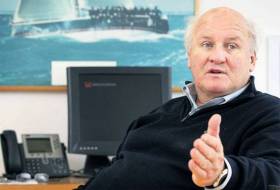Displaying items by tag: Patrick Coveney
Olympic Federation of Ireland to Appoint Sailing's Patrick Coveney as an Independent Director at AGM
Patrick Coveney, who retired in March as the chairman of the Irish Olympic Sailing Group, is to be ratified as an Independent Director of the Olympic Federation of Ireland at its Annual General Meeting on Wednesday evening.
Coveney, who was co-opted to the position by the OFI Executive Committee, served a single term as Sailing's Olympic Group Chairman up to the Tokyo 2020 Olympics held in 2021 due to COVID.
Coveney took over from Colm Barrington who retired in 2018 after Dublin Radial sailor Annalise Murphy won Silver at the 2016 Rio Olympics.
Barrington is a current Vice Chairman of the OFI.
Murphy, who retired after Tokyo, was appointed in January to the OFI Athletes’ Commission to serve from 2022 to 2024.
Sydney 2000 Olympic discus thrower John Menton now leads Sailing's Olympic Steering Group following the retirement of Coveney.
Colm Barrington Formally Relinquishes Irish Sailing’s Olympic Seat For Patrick Coveney
Colm Barrington has formally stepped down as chair of Irish Sailing’s Olympic Steering Group, as The Irish Times reports.
Greencore chief executive Patrick Coveney will succeed in the role that Barrington announced he would leave after the Rio 2016 games, at which Annalise Murphy won silver for Ireland in the Laser Radial.
Barrington — who says he considers Annalise’s medal win the high point of his 12-year tenure — was elected as first vice president of the Olympic Council of Ireland in February last year.
His successor, brother of Tánaiste Simon Coveney, is no stranger to the water as a member of the Royal Cork Yacht Club. The family previously owned a round-the-word One Tonner, Golden Apple. Coveney was a keen Enterprise dinghy helmsman sailing from Crosshaven in the 1980s.
Barrington told the newspaper that while there is a good system to bring young sailors through to international competition there is "a long way to go".
Not least are the current funding issues facing the new Chairman that led to the recent shut down of the 420 Academy, Optimist squad and Topper squads.
The senior team has also been refocussing with just under 600 days to Tokyo 2020 where Irish boats have yet to qualify.




























































